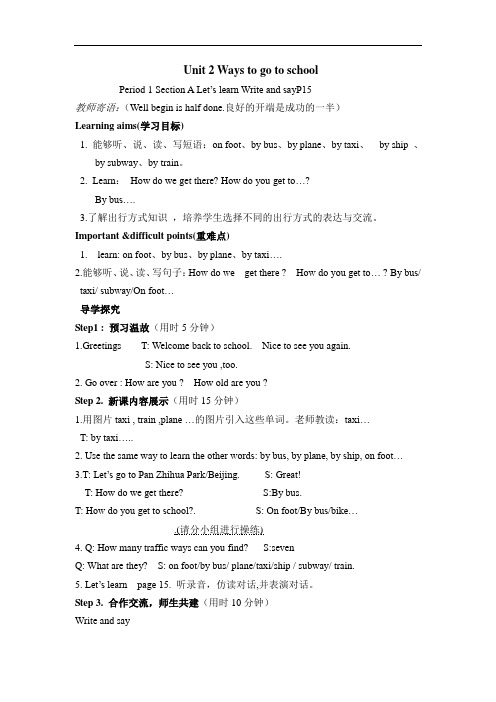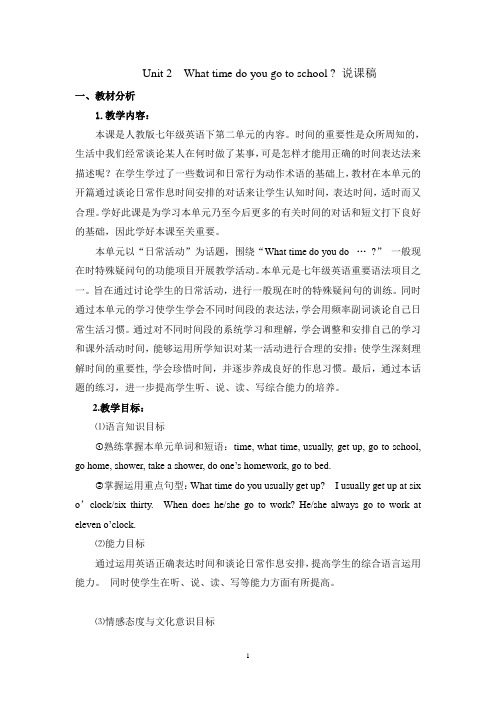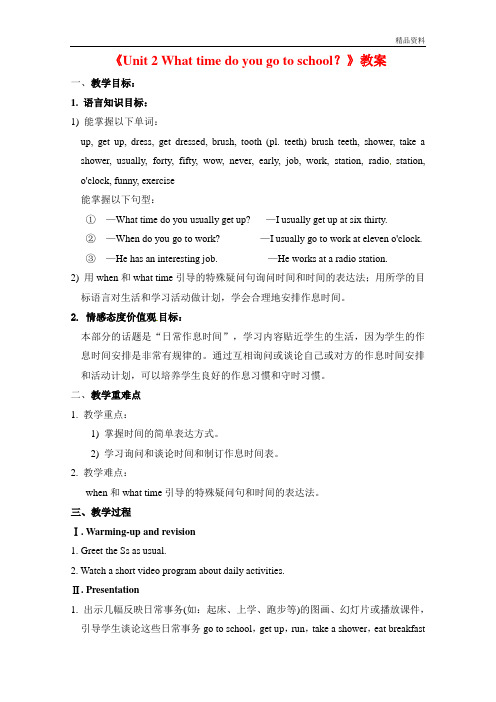七年级下unit 2 how do you go to school 公开课
- 格式:ppt
- 大小:4.12 MB
- 文档页数:34

课题:Unit2 Reading: Maybe you should learn to relax!Teaching goals:(1)Students can talk about their problems and find out some ways to solve their problems.(2) New words and phrases: football, until, fit, as much as possible, pressure, complain, include, pushy, send, all kinds of, compare, crazy, themselves, adult,on the one hand, on the other hand, orga nized.(3)To be able to write a passage, describe their own feelings about their lives. Preview:1.单词互译:足球到…为止适合,适应包括,包含推动,督促派遣,打发(反身代词)他们自己自由 pressure complain pushy compare crazy adult organized2.not until, fit…into , send…to, by themselves, it’s time for…/to…,as m uchas possible, take part in, see… doing, compare… with, on the one/other hand.通过课件闪现单词,让学生一起快速回答单词含义,达到复习效果,然后进行记忆比赛,看谁能在短时间内将课件闪现的全部单词记住的最多。
(设计意图:由于本篇课文中出现的生词较多,单词的复习和对文章中短语的设计可以让学生更轻松的理解原文,实行抢答可以充分调动学生的积极性。

Unit 2 Ways to go to schoolPeriod 1 Section A Let’s learn Write and sayP15教师寄语:(Well begin is half done.良好的开端是成功的一半)Learning aims(学习目标)1.能够听、说、读、写短语:on foot、by bus、by plane、by taxi、by ship 、by subway、by train。
2.Learn:How do we get there? How do you get to…?By bus….3.了解出行方式知识,培养学生选择不同的出行方式的表达与交流。
Important &difficult points(重难点)1.learn: on foot、by bus、by plane、by taxi….2.能够听、说、读、写句子:How do we get there ? How do you get to… ? By bus/ taxi/ subway/On foot…导学探究Step1 : 预习温故(用时5分钟)1.Greetings T: Welcome back to school. Nice to see you again.S: Nice to see you ,too.2. Go over : How are you ? How old are you ?Step 2. 新课内容展示(用时15分钟)1.用图片taxi , train ,plane …的图片引入这些单词。
老师教读:taxi…T: by taxi…..2. Use the same way to learn th e other words: by bus, by plane, by ship, on foot…3.T: Let’s go to Pan Zhihua Park/Beijing. S: Great!T: How do we get there? S:By bus.T: How do you get to school?. S: On foot/By bus/bike….(请分小组进行操练)4. Q: How many traffic ways can you find? S:sevenQ: What are they? S: on foot/by bus/ plane/taxi/ship / subway/ train.5. Let’s learn page 15. 听录音,仿读对话,并表演对话。

Unit3 How do you get to school?建平镇中学董莲凤各位领导,各位老师:大家好!我说课的内容是人教版《go for it 》七年级下册第三单元How do you get to school?的第一课时,即SectionA的1a-1c部分。
下面我从以下7方面来说一下我对这一课的认识及我的教学实施过程。
一、教材分析1、教材的地位及作用本单元的话题涉及学生上学的交通方式,与上一单元关于上学时间的话题紧密相连。
SectionA 部分展现了学生以不同的交通方式上学的场景,自然而然地将学生带入到有关彼此上学方式、出行花费的时间以及家与学校的之间的距离等问题的讨论中。
本单元的第一课时则是通过1a,1b 和1c三个主要内容的学习,来引出本单元的语言和知识目标,学习了常见的交通方式的表达,并让学生初步感知和学习“How do you get to school?”“I walk.”"How does she get to school?She takes the subway. "这样的句型,为进一步深入学习由“How long…”和“How far…?”引导的句型作好铺垫。
二、学生情况分析:对于七年级的学生来说,他们在经过七年级上个学期的英语学习后,已具有了一定的英语基础知识,同时也具备一些运用语言知识的能力。
在这样的基础上,学生对于讨论跟他们生活息息相关的内容,会很容易产生兴趣。
三、教学目标的制定根据课程标准的要求,教材的地位及作用和学生的实际情况我确立如下三方面的教学目标:即知识目标、能力目标和情感目标。
1. 知识目标:1)通过本节课的学习,使学生熟练掌握表示常见的交通工具的英文单词,如bus, train, bike, car. subway , 以及出行方式的英文表达法如:walk ,ride a bike, take the bus,drive a car , by bus ,on foot。

Unit 2 What time do you go to school ? 说课稿一、教材分析1.教学内容:本课是人教版七年级英语下第二单元的内容。
时间的重要性是众所周知的,生活中我们经常谈论某人在何时做了某事,可是怎样才能用正确的时间表达法来描述呢?在学生学过了一些数词和日常行为动作术语的基础上,教材在本单元的开篇通过谈论日常作息时间安排的对话来让学生认知时间,表达时间,适时而又合理。
学好此课是为学习本单元乃至今后更多的有关时间的对话和短文打下良好的基础,因此学好本课至关重要。
本单元以“日常活动”为话题,围绕“What time do you do …?”一般现在时特殊疑问句的功能项目开展教学活动。
本单元是七年级英语重要语法项目之一。
旨在通过讨论学生的日常活动,进行一般现在时的特殊疑问句的训练。
同时通过本单元的学习使学生学会不同时间段的表达法,学会用频率副词谈论自己日常生活习惯。
通过对不同时间段的系统学习和理解,学会调整和安排自己的学习和课外活动时间,能够运用所学知识对某一活动进行合理的安排;使学生深刻理解时间的重要性, 学会珍惜时间,并逐步养成良好的作息习惯。
最后,通过本话题的练习,进一步提高学生听、说、读、写综合能力的培养。
2.教学目标:⑴语言知识目标①熟练掌握本单元单词和短语:time, what time, usually, get up, go to school, go home, shower, take a shower, do one’s homework, go to bed.②掌握运用重点句型:What time do you usually get up?I usually get up at six o’clock/six thirty.When does he/she go to work? He/she always go to work at eleven o’clock.⑵能力目标通过运用英语正确表达时间和谈论日常作息安排,提高学生的综合语言运用能力。


《Unit 2 What time do you go to school?》教案一、教学目标:1. 语言知识目标:1) 能掌握以下单词:up, get up, dress, get dressed, brush, tooth (pl. teeth) brush teeth, shower, take a shower, usually, forty, fifty, wow, never, early, job, work, station, radio station, o'clock, funny, exercise能掌握以下句型:①—What time do you usually get up? —I usually get up at six thirty.②—When do you go to work? —I usually go to work at eleven o'clock.③—He has an interesting job. —He works at a radio station.2) 用when和what time引导的特殊疑问句询问时间和时间的表达法;用所学的目标语言对生活和学习活动做计划,学会合理地安排作息时间。
2. 情感态度价值观目标:本部分的话题是“日常作息时间”,学习内容贴近学生的生活,因为学生的作息时间安排是非常有规律的。
通过互相询问或谈论自己或对方的作息时间安排和活动计划,可以培养学生良好的作息习惯和守时习惯。
二、教学重难点1. 教学重点:1) 掌握时间的简单表达方式。
2) 学习询问和谈论时间和制订作息时间表。
2. 教学难点:when和what time引导的特殊疑问句和时间的表达法。
三、教学过程Ⅰ. Warming-up and revision1. Greet the Ss as usual.2. Watch a short video program about daily activities.Ⅱ. Presentation1. 出示几幅反映日常事务(如:起床、上学、跑步等)的图画、幻灯片或播放课件,引导学生谈论这些日常事务go to school,get up,run,take a shower,eat breakfast等,学习有关的动词短语。
人教版七年级英语(下)Unit2《Whattimedoyougotoschool》微课精讲第二单元《What time do you go to school?》微课精讲+朗读习题_♬♬第一节微课第二节微课Unit 2单词(音标)up [ʌp] adv. 向上get up 起床;站起dress [dres] v.穿衣服 n.连衣裙get dressed 穿上衣服brush [brʌʃ] v.刷刷净 n.刷子tooth [tuːθ] n. (pl. teeth[tiːθ])牙齿shower ['ʃaʊə] n. & v. 淋浴 n.淋浴器(间)take a shower 洗淋浴usually ['ju:ʒuəli] adv.通常地;一般地forty ['fɔ:(r)ti] num.四十wow [waʊ] interj.(表示惊奇或敬佩)哇;呀never ['nevə(r)] adv.从不;绝不early ['ɜːlɪ] adv. & adj.早(的)fifty ['fɪftɪ] num.五十job [dʒɒb], [dʒɑːb] n.工作;职业work [wɜːk] v. & n. 工作station ['steɪʃn] n.电(视)台;车站radio station 广播电台o'clock [ə'klɒk], [ə'klɑ:k] adv.(表示整点)……点钟night [naɪt] n. 晚上;夜晚funny ['fʌnɪ] adj.奇怪的;滑稽好笑的exercise ['eksəsaɪz] v. & n. 锻炼;练习on weekends (在)周末best [best] adj.最好的 adv.最好地;最group [gruːp] n.组;群half [hɑːf], [hæf] n. & pron. 一半;半数past [pɑːst],[pæst] prep.晚于;过(时间)adj.过去的quarter ['kwɔː(r)tə(r)] n.一刻钟;四分之一homework['həʊmwɜː(r)k] n. 家庭作业do (one’s) homework 做作业run [rʌn] v. 跑;奔clean [kliːn] v.打扫;弄干净 adj.干净的walk [wɔːk] n. & v. 行走;步行take a walk 散步;走一走quickly ['kwɪkli] adv. 很快地either ['aɪðə(r)], [ 'iːðə(r) ]adv.或者;也(用在否定词组后)either…or…要么……要么……;或者……或者……lot [lɒt], [lɑ:t] pron.大量;许多lots of 大量;许多sometimes ['sʌmtaɪmz] adv.有时taste [teɪst] v.有……的味道;品尝 n.味道;滋味life [laɪf] n.生活;生命Rick [rɪk] 里克(男名)Jim [dʒɪm] 吉姆(男名)Scott [skɒt], [skɑ:t] 斯科特(男名)Tony ['təʊnɪ] 托尼(男名)知识点汇总第二单元知识点汇总(供课前预习课后复习)◆短语归纳1. what time 几点2. go to school 去上学3. get up 起床4. take a shower 洗淋浴5. brush teeth 刷牙6. get to 到达7. do homework 做家庭作业8. go to work 去上班9. go home 回家10. eat breakfast 吃早饭11. get dressed 穿上衣服12. get home 到家13. either…or… 要么…要么…14. go to bed 上床睡觉15. in the morning/afternoon/evening 在上午/下午/晚上16. take a walk 散步17. lots of=a lot of 许多,大量18. radio station 广播电台19. at night 在晚上20. be late for=arrive late for 迟到◆用法集萃1. at + 具体时间点在几点(几分)2. eat breakfast/lunch/dinner 吃早饭/午饭/晚饭3. thirty/half past +基数词…点半4. fifteen/a quarter to +基数词差一刻到…点5. take a/an+名词从事…活动6. from…to… 从…到…7. need to do sth 需要做某事◆典句必背1. —What time do you usually get up? 你通常几点钟起床?—I usually get up at six thirty. 我通常6:30起床。